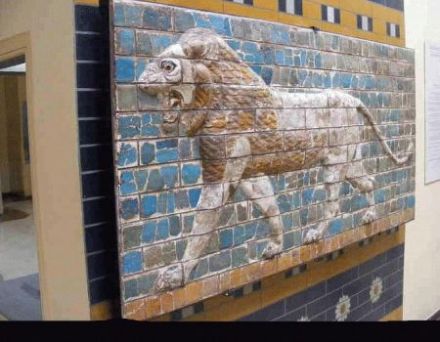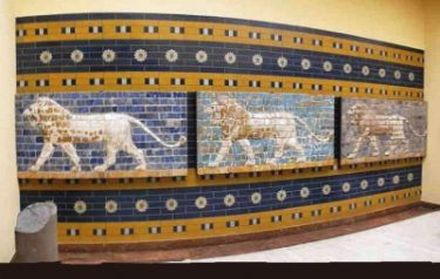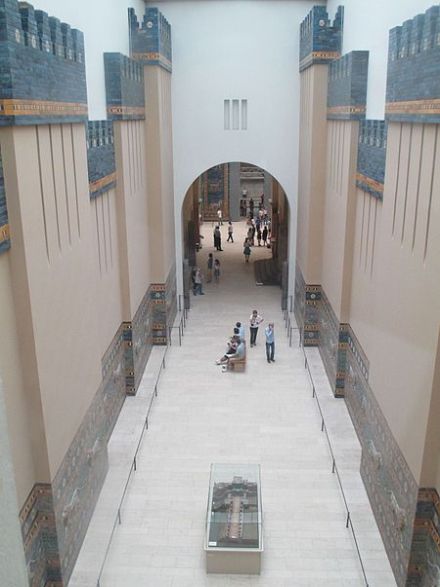Home
Chapter 9
Babylon The book of Isaiah has a curious interest with the city of Babylon. It's curious because, during the lifetime of Isaiah, Babylon is not a world power.
Isaiah prophesied in the late eighth century B.C. (The exact length of his prophetic ministry isn't known, but may have been ca. 740-700 B.C.) Assyria
is the dominant world power of his day. Babylon isn't a world power until the late seventh century to mid to late sixth century B.C. (ca. 626-539 B.C.)
It is Assyria, not Babylon, that is the dominant world power of Isaiah's day. But in many places in the book, there is just as much if not more of an
interest in Babylon than in Assyria.
Chapters 36-39 in Isaiah appear to form a unit within the book, although the topics are seemingly unrelated at first. (We see much of the same material
in II Kings 18-20.) In chapters 36 and 37, we have the Assyrian siege of Jerusalem. In chapter 38 there is the story of the sickness and recovery of King
Hezekiah. In chapter 39 a visit is recorded by emissaries of Merodach-baladan of Babylon to King Hezekiah. The sickness of Hezekiah in chapter 38 and the meeting with the
representatives of Merodach-baladan in chapter 39 take place roughly about the same time. However, these events in chapters 38 and 39 take place probably at least a
year, and likely several years, before the siege of Jerusalem by the Assyrian army recorded in chapters 36 and 37. In Hebrew literature, the material wasn't
always arranged chronologically, as we are likely to do today. In fact, when they were not dealing with a book that was an historical survey, Hebrew literature
was usually not arranged in chronological order. The Hebrews typically used other methods to arrange their literature, such as the use of key words or key
phrases or similarity in content. Most of the writings of the Old Testament prophets aren't arranged in chronological order. Of the major prophets, the one
that comes closest is perhaps Ezekiel. Yet the latest date in the book of Ezekiel is in chapter 29, in a book that contains 48 chapters.
In the late eighth century B.C. (ca. 721-702 B.C.), Merodach-baladan claimed the throne of Babylon. Although he attempted to gain independence from Assyria,
his efforts were only temporarily successful. He remained for a time as the local ruler of Babylon under Assyrian domination. While ruling over Babylon, he
sent friendly representatives with gifts to King Hezekiah of Judah. The official reason for the visit was that he had heard that Hezekiah had been sick but
had recovered. (Hezekiah's sickness and recovery is recorded in Isaiah chapter 38.) But some suggest that the real reason for this meeting may have been
to attempt to encourage an alliance against Assyria. This meeting is recorded in the thirty-ninth chapter of the book of Isaiah.
In chapter 39, Hezekiah, in a prideful moment, shows the representatives of Merodach-baladan all of his wealth and possessions:
(Isaiah 39:1-4 [BSB])
The prophet Isaiah then declares that all of these treasures will one day be taken away by Babylon, although the implication is that this will not be done any time soon, but in a more distant time period.
Then Isaiah said to Hezekiah, “Hear the word of the LORD of Hosts: The time will surely come when everything in your palace and all that your fathers have stored up until this day will be carried off to Babylon. Nothing will be left, says the LORD. And some of your descendants, your own flesh and blood, will be taken away to be eunuchs in the palace of the king of Babylon.”(Isaiah 39:5-8 [BSB])
Remember that the dominant world power at this time is not Babylon, but Assyria. Like the northern kingdom of Israel and the Kingdom of Aram (or Syria) before them, Babylon may be trying to make an alliance with Judah against Assyria. Babylon at this time is a relatively weak player on the world stage. Assyria has already destroyed Aram (Syria), with its capital of Damascus. It has already destroyed Israel, with its capital of Samaria. It will soon be breathing down the neck of Judah. Yet Isaiah says that Babylon will be the one that will carry away all of Judah's treasures. Not only that, but it won't happen right away. It will be sometime in the future...and not in the immediate future. It will be in the time of his descendants.
The chronology of this general time period is uncertain, but here is one reading of events: In chapter 38, God extends Hezekiah's life by 15 years (Isaiah 38:5). Merodach-baladan hears about Hezekiah's recovery and sends representatives to him (Isaiah 39:1). At this point, Isaiah prophesies that Babylon will take away the treasures of Judah, not in Hezekiah's day, but in the days of his descendants (Isaiah 39:5-7). Hezekiah's son, Manasseh, will begin to reign when he is only twelve years old (II Kings 21:1; II Chronicles 33:1). Since God extended Hezekiah's life by fifteen years, and since Manasseh began to reign when he was twelve years old, one possible reading is that Manasseh had not even been born, and that Hezekiah had no children at all when the prophecy to Hezekiah about the conquest by Babylon was made. Now, it could be that when Manasseh began to reign that he was a co-regent with his father. Or it may have been that he wasn't Hezekiah's first-born son. But the simplest reading would be that, when this prophecy was spoken, Hezekiah had no sons and wouldn't have any for another two or three years. So this is another indication that the prophecy about Babylon refers to some point in the more distant and not immediate future. That's important to remember, because, even though Babylon occasionally makes some rumblings of discontent and rebellion, they are still under the domination of Assyria and will be so for almost another century. Hezekiah is relieved to hear this prophecy, because it indicates that he will have peace during his time. His descendants won't, but that can is being kicked down the road for a period of time.
Chapters 36-39 in Isaiah seem to be grouped together because they center around Hezekiah, and also because they stress the concepts of pride, humility, and where we need to place our trust. Hezekiah and the city of Jerusalem survived the Assyrian army because Hezekiah humbled himself and trusted in God. Hezekiah's life was extended by fifteen years in chapter 38 because he humbled himself and trusted in God. Yet, in chapter 39 we see Hezekiah's pride regarding his wealth and possessions. The irony is that Hezekiah will only continue to have his wealth and possessions because God will save him from the Assyrian army. One of the lessons of these chapters is that we need to humble ourselves and to place our trust in God.
Assyria is a point of focus in chapters 36 and 37, but in chapter 39 the focus changes to Babylon. Babylon's part in the kingdom of Judah's story is pervasive throughout the book of Isaiah. Isaiah prophesies persistently that Babylon will play a very important role in Judah's future...not their immediate future, but their future.
Chapters 13-23 of Isaiah contain oracles against the nations. These are mostly oracles of doom. The nations include (in order) Babylon (13:1-14:23 [and again in 21:1-10]), Assyria (14:24-27), Philistia (14:28-32), Moab (ch.15-16), Syria and Israel (ch.17), Ethiopia (ch. 18), Egypt (ch. 19-20), Edom (21:11-12), Arabia (21:13-17), Judah (ch.22), and Tyre (ch.23).
A couple of things are interesting about the way things are arranged in these chapters. Not only is Babylon first in the list, but take a look at the number of verses allotted to each nation: Babylon (65 verses)Assyria (4 verses)
Philistia (5 verses)
Moab (23 verses)
Syria and Israel (14 verses)
Ethiopia (7 verses)
Egypt (31 verses)
Edom (2 verses)
Arabia (5 verses)
Judah (25 verses)
Tyre (18 verses) Remember that Babylon is not the dominant world power at this time. Assyria is. Yet Babylon is emphasized more than any other nation. The oracle against Babylon begins as follows:
On a bare hill raise a signal,
cry aloud to them;
wave the hand for them to enter
the gates of the nobles.
(Isaiah 13:2 [RSV])
God says that he is going to bring a mighty force against Babylon.
I myself have commanded my consecrated ones,
have summoned my mighty men to execute my anger,
my proudly exulting ones.
Hark, a tumult on the mountains
as of a great multitude!
Hark, an uproar of kingdoms,
of nations gathering together!
The LORD of hosts is mustering
a host for battle.
They come from a distant land,
from the end of the heavens,
the LORD and the weapons of his indignation,
to destroy the whole earth.
Wail, for the day of the LORD is near;
as destruction from the Almighty it will come!
Therefore all hands will be feeble,
and every man's heart will melt,
and they will be dismayed.
Pangs and agony will seize them;
they will be in anguish like a woman in travail.
They will look aghast at one another;
their faces will be aflame.
(Isaiah 13:3-8 [RSV]) God is raising an army to go to war against Babylon. In verse six we see a mention of "the day of the Lord".
Wail, for the day of the LORD is near;
as destruction from the Almighty it will come!
(Isaiah 13:6 [RSV]) The phrase "the day of the LORD" is used at least once in the Old Testament to refer to the Sabbath Day: "If you turn back your foot from the Sabbath,
from doing your pleasure on my holy day,
and call the sabbath a delight
and the holy day of the LORD honorable;
if you honor it, not going your own ways,
or seeking your own pleasure, or talking idly;
then you shall take delight in the LORD,
and I will make you ride upon the heights of the earth;
I will feed you with the heritage of Jacob your father,
for the mouth of the LORD has spoken."
(Isaiah 58:13-14) In the New Testament, we see a similar phrase, "the Lord's Day", used once to apparently refer to Sunday (Revelation 1:10). I was in the Spirit on the Lord's day...
(Revelation 1:10a [WEB]) But the phrase is more typically used to indicate a time that God exercises vengeance against his enemies and rescues his people. We typically think of a coming "day of the LORD" as referring to the Second Coming. In the New Testament "the day of the Lord" and similar phrases are generally used to refer to the Second Coming. But in the Old Testament, it is more often used to refer to a day this side of the Second Coming--a day of God's vengeance on sinful nations and of the rescue of faithful remnants of his people. The "day of the LORD" in this passage in Isaiah refers to the day when God brings defeat on Babylon. But it also begins to take on apocalyptic imagery. While it is probably still talking about the overthrow of Babylon, it makes one wonder if there might also be a type/antitype relationship at work here. One wonders if there are echoes here of a later time when the true substance, of which the overthrow of Babylon is merely the dim shadow, might also be in mind.
Behold, the day of the LORD comes,
cruel, with wrath and fierce anger,
to make the earth a desolation
and to destroy its sinners from it.
For the stars of the heavens and their constellations
will not give their light;
the sun will be dark at its rising
and the moon will not shed its light.
I will punish the world for its evil,
and the wicked for their iniquity;
I will put an end to the pride of the arrogant,
and lay low the haughtiness of the ruthless.
I will make men more rare than fine gold,
and mankind than the gold of Ophir.
(Isaiah 13:9-12 [RSV]) We've seen that it's somewhat typical for Isaiah to start a prophecy by referring to his day and time but end up referring to a more distant future. So it's possible that the king of Babylon and the defeat of Babylon is also an echo of something different to be accomplished in the latter days. In the book of Revelation, the word "Babylon" is found six times, where it is used symbolically to refer to Rome or, according to some interpretations, to the Roman Catholic Church or to the rule of Satan himself. While it's possible that these verses in Isaiah are simply referring to the defeat of Babylon in apocalyptic language, it is also possible that they are a dim foreshadowing of a later and even greater event at the end of time.
Many of the oracles against Babylon will refer to the stars. The Babylonians were known as astrologers. They trusted in their astrology and their magic arts. God, through the prophet Isaiah, mocks them or gives subtle digs at the futility of the things in which they trust.
For the stars of the heavens and their constellations
will not give their light;
the sun will be dark at its rising
and the moon will not shed its light.
(Isaiah 13:10 [RSV]) Isaiah also prophesies in the oracle against Babylon about the Medes:
Behold, I am stirring up the Medes against them,
who have no regard for silver
and do not delight in gold.
(Isaiah 13:17) The Medes were a people who lived in western Asia in an area mostly occupied by Iran today. The Medes were often confused with, associated with, and allied with the Persians. Five times in the Old Testament, the Medes and the Persians are referred to together as a single group--once in Esther and four times in Daniel. In Esther we read about "the laws of the Persians and the Medes":
...the laws of the Persians and the Medes...
(Esther 1:19 [WEB])
In Daniel, three times we read about "the law of the Medes and Persians":
...the law of the Medes and Persians...
(Daniel 6:8,12,15 [WEB]) Also in the book of Daniel, we see the two peoples again grouped togther at the great feast of the Babylonian ruler, King Belshazzar. The king is terrified as he sees a hand writing on the wall. Daniel is called to interpret the writing:"And this is the writing that was inscribed: MENE, MENE, TEKEL, and PARSIN. This is the interpretation of the matter: MENE, God has numbered the days of your kingdom and brought it to an end; TEKEL, you have been weighed in the balances and found wanting; PERES, your kingdom is divided and given to the Medes and Persians."
(Daniel 5:25-28) The Medes at the time that Isaiah was prophesying really weren't enemies of Babylon. In fact, this is prior to the time that the Medes would actually have a kingdom of their own. They were basically just a people, not a kingdom. Even after they become a kingdom, they would be an ally of Babylon in bringing a final end to the Assyrian Empire, which took place in four major battles between 614 and 605 B.C.: Ashur--614 B.C.; Nineveh--612 B.C.; Haran--609 B.C.; and Carchemish--605 B.C..
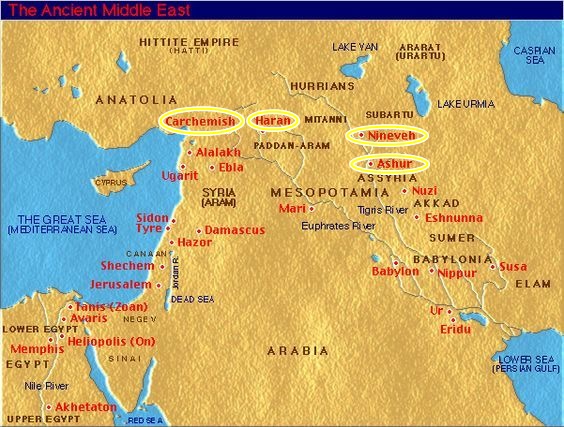
(Credit: Christianity Oasis Ministry [map edited]; Free)
But Isaiah looks beyond all this. None of the events involving the Assyrian Empire will have as direct an impact on the nation of Judah as will events associated with Babylon. During the latter years of the Assyrian Empire, Babylon prospered and became the largest city in the ancient world, with more than 200,000 inhabitants. Among its extravagant features were the Temple of Marduk, the Palace of Nebuchadnezzar, the rebuilt Etemenanki (the original of which is thought by some to be the Biblical Tower of Babel), the Hanging Gardens of Babylon (one of the Seven Wonders of the Ancient World), the Processional Way, and the Ishtar Gate (which at one time, as part of the walls of Babylon, was also considered to be one of the Seven Wonders of the Ancient World).
Processional Way Scenes
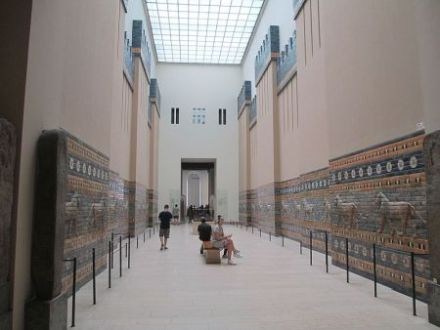 [Pergamon Museum in Berlin] (Credit: Avishai Teicher; BY-SA 4.0 Creative Commons License)
|
|
Ishtar Gate
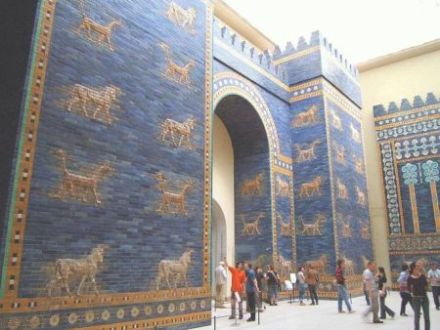 The outer, smaller portion of the Ishtar Gate. There were eight such double gates that allowed access into the city of Babylon. [Pergamon Museum in Berlin] (Credit: Rictor Norton; BY 2.0 Creative Commons License) |
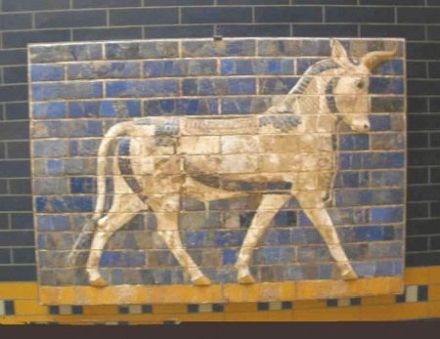 Aurochs (an extinct wild ox) [Istanbul Archaeological Museum] (Credit: Gryffindor; BY-SA 4.0 Creative Commons License) |
 "Dragon" (Mushussu). {A mythological creature composed of a snake, lion, eagle, and a scorpion.} [Istanbul Archaeological Museum] (Credit: Mark Ahsmann; BY-SA 3.0 Creative Commons License) |
Babylon began to take people from Judah captive in 605 B.C. There were three major stages of Babylonian Captivity:
605 B.C. (Daniel and other educated youths of Judean royal or noble families [Daniel 1:3-4])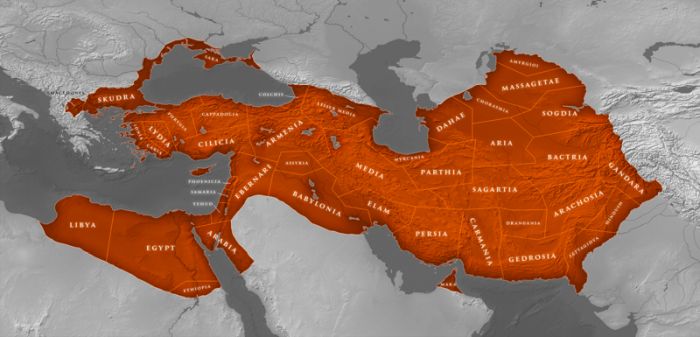
Persian Empire (ca. 480 B.C.)
(Credit: Hossein Shahni BY-SA 4.0 Creative Commons License)
Behold, I am stirring up the Medes against them,
who have no regard for silver
and do not delight in gold.
Their bows will slaughter the young men;
they will have no mercy on the fruit of the womb;
their eyes will not pity children.
And Babylon, the glory of kingdoms,
the splendor and pomp of the Chaldeans,
will be like Sodom and Gomorrah
when God overthrew them.
(Isaiah 13:17-19) But there is more to be said:
And Babylon, the glory of kingdoms,
the splendor and pride of the Chaldeans,
will be like Sodom and Gomorrah
when God overthrew them.
It will never be inhabited
or dwelt in for all generations;
no Arab will pitch his tent there,
no shepherds will make their flocks lie down there.
But wild beasts will lie down there,
and its houses will be full of howling creatures;
there ostriches will dwell,
and there satyrs will dance.
Hyenas will cry in its towers,
and jackals in the pleasant palaces;
its time is close at hand
and its days will not be prolonged.
(Isaiah 13:19-22 [RSV]) Jeremiah also prophesies:
..and Babylon shall become a heap of ruins, the haunt of jackals, a horror and a hissing, without inhabitant.... "How Babylon is taken, the praise of the whole earth seized!
How Babylon has become a horror among the nations! The sea has come up on Babylon; she is covered with its tumultuous waves. Her cities have become a horror, a land of drought and a desert, a land in which no one dwells, and through which no son of man passes." (Jeremiah 51:37,41-43) Jeremiah lives within the time frame of the Babylonian Empire, whereas Isaiah preceded the beginning of it by about one hundred years. But Isaiah was often more concerned with the future Babylonian Empire than with the Assyrian Empire of his own day, and he would predict not only the Babylonian Exile but also the return of the Jewish people from Babylonian Exile.
Both Isaiah and Jeremiah speak of the coming destruction of Babylon, but Isaiah particularly speaks of its destruction being permanent. (Jeremiah's language might imply this, but doesn't state it as definitely as Isaiah.) Isaiah says,
It will never be inhabitedor dwelt in for all generations;
Babylon was conquered by the Persians under Cyrus the Great in 539 B.C. It remained under Persian control until the time of Alexander the Great in the late fourth century B.C. Alexander actually died of a fever (after heavy drinking) in the palace of Nebuchadnezzar in Babylon in 323 B.C.
The people of Babylon were deported to the newly built town of Seleucia in the third century B.C. (This is the Seleucia on the Tigris, not the Seleucia in Syria from which the Apostle Paul sailed in Acts 13:4) This Seleucia would be the first capital of the Seleucid Empire. This marked the end of Babylon as a prominent and influential city. By the late second century B.C., it was only lightly inhabited and would remain so during the early Christian centuries. After the Muslim conquests in the seventh century A.D., it would eventually be completely abandoned. Lying partly beneath the Euphrates River due to a change in the course of the river, and the remainder of it being used as a quarry by nearby towns, the largest and greatest city of the ancient world had become a heap of ruins. Except for an occasional use by nearby towns as a source of stones for building materials, ancient Babylon would be forgotten by history until archaeological excavations in the nineteenth and twentieth centuries. Those excavations would gradually begin to reveal such features as the Ishtar Gate.Ruins of Babylon
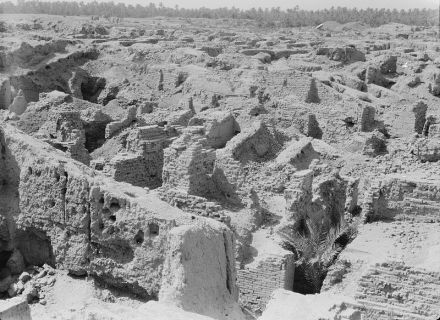 (Credit: Library of Congress Prints and Photographs Division; Public Domain) |
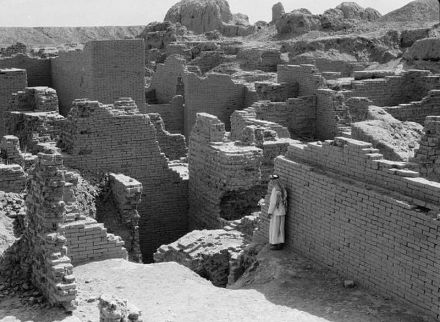 (Public Domain) |
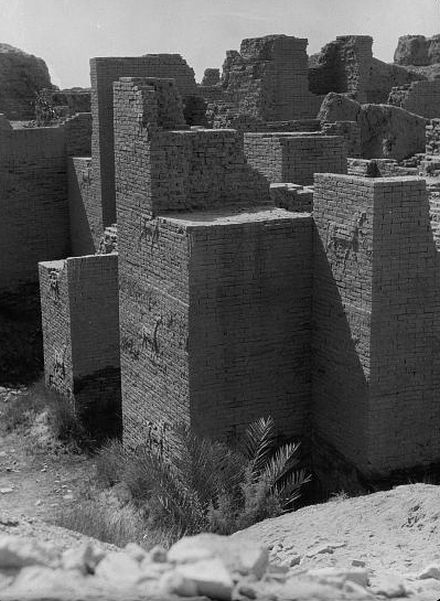 Ruins of the Ishtar Gate (Credit: Library of Congress Prints and Photographs Division; Public Domain) |
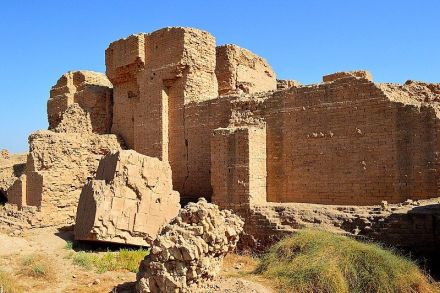 North Palace of Nebuchadnezzar (Credit: Osama Shukir Muhammed Amin; BY-SA 4.0 Creative Commons License) 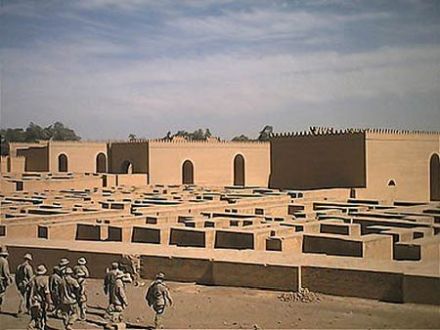 U.S. Marines at the reconstructed ruins of Babylon, 2003 (Credit: Osama Shukir Muhammed Amin; Public Domain) |
Today, the portion of Babylon that doesn't lie beneath the waters of the Euphrates is a historical and tourist site. (And one doesn't take an important historical monument or tourist site and convert it into a condominium complex. One doesn't bulldoze the Washington Monument to make a trailer park.) So the prophecy of Isaiah lives on: It will never be inhabited or dwelt in for all generations There are a lot of ancient cities that could have been chosen instead of Babylon. It could have been Athens,

(Credit: sman_5 [at Pixabay]; Public Domain [Pixabay license])
or Jericho,
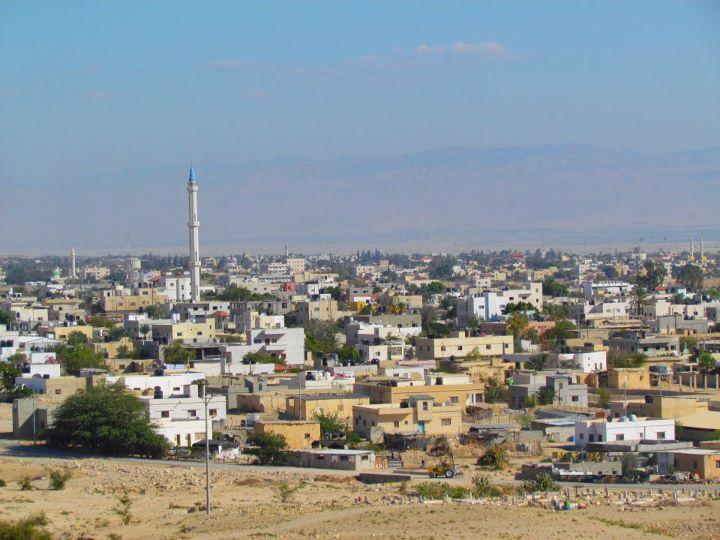
(Credit: Sharon Schlomo [at PikiWiki]; BY 2.5 Creative Commons License)
or Tarsus,
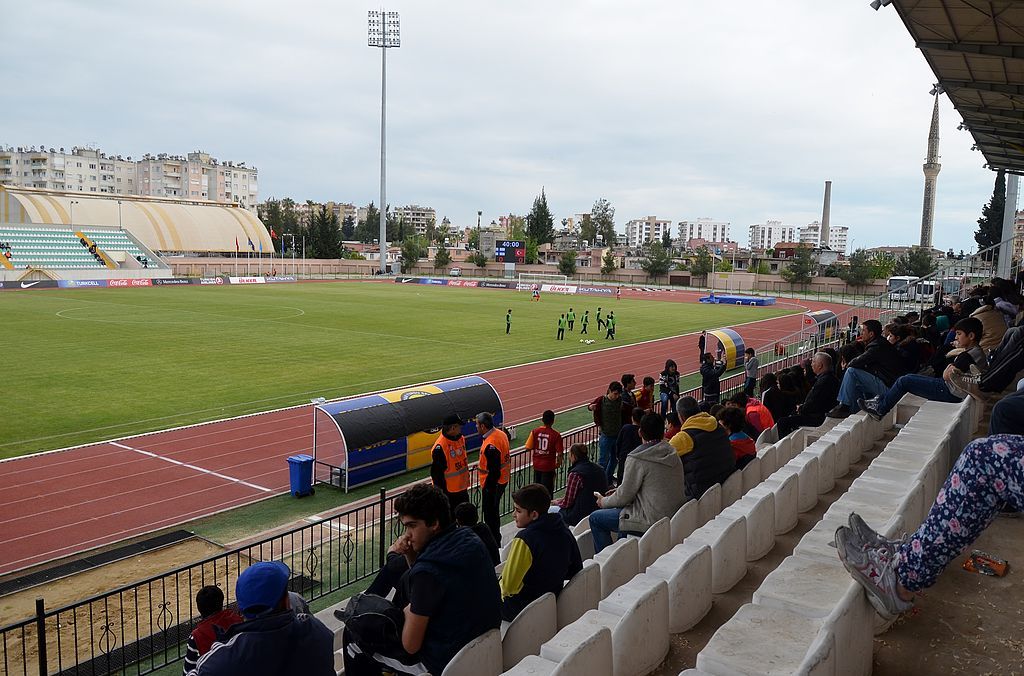
(Credit: CeeGee [at English Wikipedia]; BY-SA 4.0 Creative Commons License
or Rome,

(Credit: David Iliff; BY-SA 3.0 Creative Commons License)
or Gaza,

(Credit: Grauesel; Public Domain)
or Jerusalem.

(Credit: Berthold Werner; Public Domain)
But Isaiah prophesied that the greatest city of the ancient world, Babylon, would be the one that would not only be destroyed, but never inhabited for all generations. "Remember this and consider, recall it to mind, you transgressors, remember the former things of old; for I am God, and there is no other; I am God, and there is none like me, declaring the end from the beginning and from ancient times things not yet done, saying, `My counsel shall stand, and I will accomplish all my purpose,'"
(Isaiah 46:8-10 [RSV]) Chapter fourteen contains a taunt that God teaches to his people to use against the king of Babylon when they return from captivity. Remember that, at this point in time,1 Judah is not in captivity. The dominant world power is Assyria. And the only recent contact that we are made aware of between Judah and Babylon is when the king of Babylon sends presents to King Hezekiah. But Isaiah looks forward to the events of a more distant future. For the LORD will have compassion on Jacob and will again choose Israel, and will set them in their own land, and sojourners will join them and will attach themselves to the house of Jacob. And the peoples will take them and bring them to their place, and the house of Israel will possess them in the LORD’s land as male and female slaves. They will take captive those who were their captors, and rule over those who oppressed them.
(Isaiah 14:1-4a) The taunt begins with a message that the earth now has peace since its oppressor has been vanquished and is no more: How the oppressor has ceased,
the insolent fury ceased!
The LORD has broken the staff of the wicked,
the scepter of rulers,
that struck the peoples in wrath
with unceasing blows,
that ruled the nations in anger
with unrelenting persecution.
The whole earth is at rest and quiet;
they break forth into singing.
The cypresses rejoice at you,
the cedars of Lebanon, saying,
`Since you were laid low,
no woodcutter comes up against us.'"
(Isaiah 14:4b-8)
The focus now turns to the unseen realm of the dead and to those who have died. They taunt the king of Babylon even beyond the realm of the living:
Sheol beneath is stirred up
to meet you when you come;
it rouses the shades to greet you,
all who were leaders of the earth;
it raises from their thrones
all who were kings of the nations.
All of them will answer
and say to you:
`You too have become as weak as we!
You have become like us!'
Your pomp is brought down to Sheol,
the sound of your harps;
maggots are laid as a bed beneath you,
and worms are your covers."
(Isaiah 14:9-11)
Even those who are dead are depicted as taunting the king of Babylon even after death. His evil deeds will follow him even beyond the grave.
The taunt continues:
How you are fallen from heaven,
O Day Star, son of Dawn!
How you are cut down to the ground,
you who laid the nations low!
You said in your heart,
`I will ascend to heaven;
above the stars of God
I will set my throne on high;
I will sit on the mount of assembly
in the far reaches of the north;
I will ascend above the heights of the clouds;
I will make myself like the Most High.'
But you are brought down to Sheol,
to the far reaches of the pit.
Those who see you will stare at you
and ponder over you:
`Is this the man who made the earth tremble,
who shook kingdoms,
who made the world like a desert
and overthrew its cities,
who did not let his prisoners go home?'
All the kings of the nations lie in glory,
each in his own tomb;
but you are cast out, away from your grave,
like a loathed branch,...
like a dead body trampled underfoot.
(Isaiah 14:12-19a,c)
The words "Day Star" (or "morning star" in several versions) are translated as "Lucifer" in the King James Version. The word "Lucifer" comes from Latin. The Latin Vulgate translates the Hebrew word with the Latin word "lucifer" which means "morning star" or "Venus". It has become traditional to interpret this as referring to Satan. The King James Versions and some other early versions capitalize the word and treat it as a proper name. It is even codified in Mormon scripture as such (Doctrine and Covenants 76:25-29). But the passage actually specifies that it is a taunt against the king of Babylon. The pride and arrogance of the king of Babylon was such that he saw himself as a light from heaven who brings light greater than all other lights. Does Isaiah also have Satan in mind? Possibly, but not certainly. It seems more likely that some of the characteristics applied to the king of Babylon may also be applicable to and true of Satan, but that doesn't mean thatD Satan is an intended topic here. Some have concluded from a statement of Jesus in Luke chapter ten that Satan is intended.
And he said to them, "I saw Satan fall like lightning from heaven."
(Luke 10:18)
However, it may be a bit of a stretch to confidently construe that as a commentary on Isaiah chapter fourteen. An echo of it? Perhaps.
The Bible does depict Satan as having been cast out of heaven. In addition to Jesus' statement in Luke chapter ten, we have two references in the book of Revelation, one of which specifically refers to Satan by name; the other which may or may not refer to Satan:
And the fifth angel blew his trumpet, and I saw a star fallen from heaven to earth, and he was given the key to the shaft of the bottomless pit. He opened the shaft of the bottomless pit, and from the shaft rose smoke like the smoke of a great furnace, and the sun and the air were darkened with the smoke from the shaft. Then from the smoke came locusts on the earth, and they were given power like the power of scorpions of the earth.
(Revelation 9:1-3)
And the great dragon was thrown down, that ancient serpent, who is called the devil and Satan, the deceiver of the whole world -- he was thrown down to the earth, and his angels were thrown down with him.
(Revelation 12:9)
There are parallels. The morning star is in Heaven. In the depiction in Isaiah, it is brought down. Satan was in Heaven. He was cast down. So there are parallels. And Isaiah often has more than one application in mind at the same time. But it might be better to regard this as being applicable to Satan rather than being intended to be about Satan. Homiletics rather than exegesis. In other words, you can preach a sermon making interesting parallels or applications based on the passage, but those aren't necessarily the original and primary meaning of the passage.
One lesson that we can learn from a broader study of Scripture is that the true morning star is neither the king of Babylon nor Satan. The true morning star is Jesus Christ.
"I, Jesus, have sent My angel to give you this testimony for the churches. I am the Root and the Offspring of David, the bright Morning Star."
(Revelation 22:16 [BSB])
He is the one who shines the brightest and truly brings light.
After the taunt against the king of Babylon concludes, God says,
"I will rise up against them," declares the LORD of hosts, "and will cut off from Babylon name and remnant, descendants and posterity," declares the LORD. "And I will make it a possession of the hedgehog, and pools of water, and I will sweep it with the broom of destruction," declares the LORD of hosts."
(Isaiah 14:22-23)
In the broad section of Isaiah in which we have oracles against the nations, Babylon is mentioned first and longest. But the first mention isn't the only mention. A second oracle against Babylon is found in chapter twenty-one.
The oracle concerning the wilderness of the sea.
it comes from the wilderness,
from a terrible land.
A stern vision is told to me;
the traitor betrays,
and the destroyer destroys.
Go up, O Elam;
lay siege, O Media;
all the sighing she has caused
I bring to an end.
(Isaiah 21:1-2)
Elam and Media are areas that would become part of the Persian Empire, which would conquer Babylon in 539 B.C.
For thus the Lord said to me:
"Go, set a watchman;
let him announce what he sees.
When he sees riders, horsemen in pairs,
riders on donkeys, riders on camels,
let him listen diligently,
very diligently."
Then he who saw cried out:
"Upon a watchtower I stand, O Lord,
continually by day,
and at my post I am stationed
whole nights.
And behold, here come riders,
horsemen in pairs!"
And he answered,
"Fallen, fallen is Babylon;
and all the carved images of her gods
he has shattered to the ground."
(Isaiah 21:6-9)
Babylon will fall to the Persian Empire in 539 B.C. Isaiah predicts it in the eighth century B.C.
Later in the book, Isaiah speaks more clearly about the Jewish people being in Babylonian Captivity, as though it was a present reality already.
Thus says the LORD,
your Redeemer, the Holy One of Israel:
"For your sake I will send to Babylon
and break down all the bars,
and the shouting of the Chaldeans will be turned to lamentations.
I am the LORD, your Holy One,
the Creator of Israel, your King."
(Isaiah 43:14-15 [RSV])
We amazingly will find out who it is that will deliver the Jews from Babylonian captivity---not just which empire. We have already seen that it will be the Persian Empire. But we will find out the name of the person responsible from a human perspective for the deliverance. God is the ultimate deliverer and redeemer. But Isaiah also names the human instrument involved.
Thus says the LORD, your Redeemer,
who formed you from the womb:
"I am the LORD, who made all things,
who stretched out the heavens alone,
who spread out the earth -- Who was with me? --
who frustrates the omens of liars,
and makes fools of diviners;
who turns wise men back,
and makes their knowledge foolish;
confirms the word of his servant,
and performs the counsel of his messengers;
who says of Jerusalem, `She shall be inhabited,'
and of the cities of Judah, `They shall be built,
and I will raise up their ruins';
says to the deep, `Be dry,
I will dry up your rivers';
who says of Cyrus, `He is my shepherd,
and he shall fulfil all my purpose';
saying of Jerusalem, `She shall be built,'
and of the temple, `Your foundation shall be laid.'"
Thus says the LORD to his anointed, to Cyrus,
whose right hand I have grasped,
to subdue nations before him
and ungird the loins of kings,
to open doors before him
that gates may not be closed:
"I will go before you
and level the mountains,
I will break in pieces the doors of bronze
and cut asunder the bars of iron,
I will give you the treasures of darkness
and the hoards in secret places,
that you may know that it is I, the LORD,
the God of Israel, who call you by your name.
For the sake of my servant Jacob,
and Israel my chosen,
I call you by your name,
I surname you, though you do not know me.
I am the LORD, and there is no other,
besides me there is no God;
I gird you, though you do not know me,
that men may know, from the rising of the sun
and from the west, that there is none besides me;
I am the LORD, and there is no other."
(Isaiah 44:24-45:6 [RSV])
Again of Cyrus, God says through his prophet:
"I have aroused him in righteousness,
and I will make straight all his ways;
he shall build my city
and set my exiles free,
not for price or reward,"
says the LORD of hosts.
(Isaiah 45:13 [RSV])
God calls Cyrus by name. God names who will deliver his people from Babylonian captivity:
---before Cyrus and the Persians conquer the Babylonians
---before Cyrus elevates the Persian Empire to a world power
---before Cyrus is even born
---before the Babylonians even take God's people into captivity
---long before the Babylonians even become a world power
In chapter 46, God compares himself to the gods of the Babylonians. (Bel and Nebo are some of the chief gods of the Babylonians.)
Bel bows down, Nebo stoops,
their idols are on beasts and cattle;
these things you carry are loaded
as burdens on weary beasts.
They stoop, they bow down together,
they cannot save the burden,
but themselves go into captivity.
(Isaiah 46:1-2 [RSV])
The Babylonians have to carry their gods, even into captivity. They become burdens for the very tired donkeys and cattle of the Babylonians. Their gods can't even save the cows, but have to be borne by them. Contrast that with God:
"Listen to me, O house of Jacob,
all the remnant of the house of Israel,
who have been borne by me from before your birth,
carried from the womb;
even to your old age I am he,
and to gray hairs I will carry you.
I have made, and I will bear;
I will carry and will save."
(Isaiah 46:3-4)
The Babylonians have to make their gods. The utter foolishness of such a concept is pointed out:
"To whom will you liken me and make me equal,
and compare me, that we may be alike?
Those who lavish gold from the purse,
and weigh out silver in the scales,
hire a goldsmith, and he makes it into a god;
then they fall down and worship!
They lift it upon their shoulders, they carry it,
they set it in its place, and it stands there;
it cannot move from its place.
If one cries to it, it does not answer
or save him from his trouble."
(Isaiah 46:5-7 [RSV])
The people of Judah need to consider the powerlessness and absence of any knowledge in the Babylonian gods, and remember the power of God, and what he has done, and that what he predicts will indeed come to pass.
"I am God, and there is none like me,
declaring the end from the beginning
and from ancient times things not yet done,
saying, `My counsel shall stand,
and I will accomplish all my purpose,'
calling a bird of prey from the east,
the man of my counsel from a far country.
I have spoken, and I will bring it to pass;
I have purposed, and I will do it."
(Isaiah 46:9b-11 [RSV])
Some other comments in the book of Isaiah about Babylon:
Come down and sit in the dust,
O virgin daughter of Babylon;
sit on the ground without a throne,
O daughter of the Chaldeans!
For you shall no more be called
tender and delicate.
Take the millstones and grind flour,
put off your veil,
strip off your robe, uncover your legs,
pass through the rivers.
Your nakedness shall be uncovered,
and your disgrace shall be seen.
I will take vengeance,
and I will spare no one....
Now therefore hear this, you lover of pleasures,
who sit securely,
who say in your heart,
"I am, and there is no one besides me;
I shall not sit as a widow
or know the loss of children":
These two things shall come to you
in a moment, in one day;
the loss of children and widowhood
shall come upon you in full measure,
in spite of your many sorceries
and the great power of your enchantments.
(Isaiah 47:1-3,8-9)
The last lines,
and the great power of your enchantments.
Stand fast in your enchantments
and your many sorceries,
with which you have labored from your youth;
perhaps you may be able to succeed,
perhaps you may inspire terror.
You are wearied with your many counsels;
let them stand forth and save you,
those who divide the heavens,
who gaze at the stars,
who at the new moons predict
what shall befall you.
Behold, they are like stubble,
the fire consumes them;
...Such to you are those with whom you have labored,
who have trafficked with you from your youth;
they wander about each in his own direction;
there is no one to save you.
(Isaiah 47:12-14a,15 [RSV])
God's message to his people:
Go forth from Babylon, flee from Chaldea,
declare this with a shout of joy, proclaim it,
send it forth to the end of the earth;
say, "The LORD has redeemed his servant Jacob!"
(Isaiah 48:20 [RSV])
A man in the eighth century B.C. in the kingdom of Judah claimed to speak for God. He predicted that Judah would be taken captive, not by Assyria, the dominant power of the day, but by Babylon, a minor player that had been subjugated to the Assyrian powerhouse. It wouldn't be in the days of Hezekiah, but at a later time. He predicts their release from captivity due to the utter defeat and destruction of the Babylonians. He not only indicates which kingdom will do this, but he specifies by name the person who will lead them--Cyrus. Almost 200 years after he speaks, all of what he said came true...except for one thing...something that came later and would continue to this day: He said that Babylon would never be inhabited or dwelt in for all generations. Now lying partly beneath the waters of the Euphrates River, the rest in ruins and an historic site, the fulfillment of that prophecy continues even to our day.
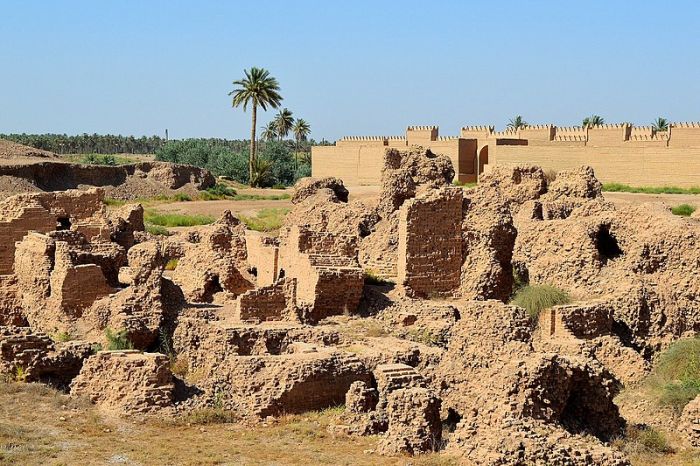
(Credit: Osama Shukir Muhammed Amin; BY-SA 4.0 Creative Commons License)
"Remember this and consider,
recall it to mind, you transgressors,
remember the former things of old;
for I am God, and there is no other;
I am God, and there is none like me,
declaring the end from the beginning
and from ancient times things not yet done,
saying, `My counsel shall stand,
and I will accomplish all my purpose,'...
(Isaiah 46:8-10 [RSV])
